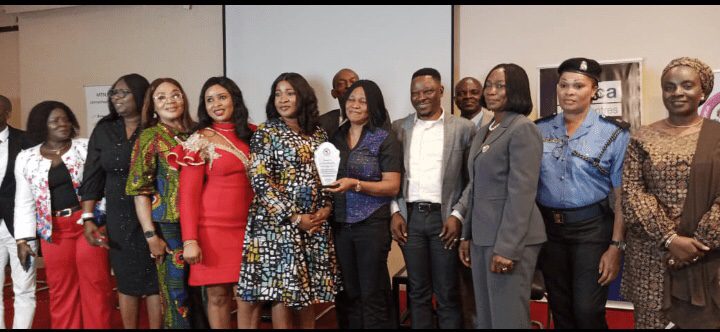
Women have been told to take on leadership and technology roles in all parts of the economy and to keep improving their skills to better position themselves and close the gap between men and women in the world.
This call was made by human rights activist Dr. Joe Odumakin at the Women Entrepreneurs and Executives Tech Summit (WEETS) on Thursday in Lagos, Nigeria.
Dr. Odumakin highlighted the need for women’s issues to take centre stage while encouraging women to effect meaningful change.
According to her, “assertive women must be determined because where determination exists, failure can never dismantle the flag of success.” Albert Pine says that “what we do for ourselves dies with us, but what we do for others and the world remains”.

“Women should not only be found in the other room, but they should be somewhere they can meaningfully effect change. Through technology, I seek justice for people. We go to court and seek appearances. We have this tool in order to use it to effect change. I want our women to be the driving force, to get empowered and be skilful.”
“Women should endeavour to assume leadership roles wherever they find themselves. Women must not think that men will always give them a chance,” she added.
The award-winning activist emphasised the need for mentorship between established and budding entrepreneurs, adding that there is a need for women to stay united.
Dr. Odumakin said: “Entrepreneurs should also encourage upcoming ones so that they can have role models in them.” Nobody should diss us as women. Assertive women will always want to remain together, whether they are executives or entrepreneurs.
Speaking on the theme ‘Reskilling women and girls to thrive in the digital economy,’ Dr. Omowunmi Hassan, the WEETS keynote speaker, said women, and the nation in general, need to transcend speaking about issues to doing the work to achieve the desired change, adding that change can be achieved through technology.
“… as women, what skills do we have, what do we know?… We are talking about the digital economy; we are talking about technologies. What do we want to do better? So, what is it that is our passion, what do we want to drive? What problem in Nigeria do we get angry about?
Read also: Women in South Africa’s tech industry earn less pay than men – Women in Tech
“When we begin to talk, all this grammar and then you have people talking; I’m wondering what exactly is going on.” We need a lot of us to come out and do better… When we talk to all the girls in ICT today, we tell them to let us slay with our brains. Nigerian girls, are we together? Begin slaying, make-up, and doing everything except holding your brain. If you can pass Jamb, you can climb the mast.
“There was a lockdown. Nobody could import things. Another lockdown could happen. ” So, you must reskill now. We need skills, ma’am. I want to challenge all of us. There are different areas of technology that are our solutions.
“Recently, we called the elderly people in the last two days, talking to them in Alausa.” People who have retired and don’t have opportunities again are now looking for ways to reskill. Don’t let it be too late; we can start. “
Dr. Hassan called on women to make ample use of the gadgets in their possession, adding that it was time to build real solutions and champion the advancement of technology in Nigeria.
According to her, “If we want to reskill, everybody must try.” All these cameras are in our hands: can we try to see how they made the parts, or must we continue to import them? Because if we want to really encourage Nigeria’s GDP, let’s use these problems in Nigeria to build real solutions that would solve them, and this is our advocacy. I welcome every girl in Nigeria, every woman, to join the advocacy. “
Women Maximizing the Internet

The General Manager, MTN Broadband Business, Mrs Onyinye Ikenna-Emeka, emphasised the importance of technology in society and how women are already maximising its endless possibilities.
“If 60% of women spend time on the internet trying to understand precisely how to position and drive their businesses, then really and truly, there is an opportunity to discuss how to put front and centre the need for digital skills. Foundationally, as women, we are already inquisitive enough to understand that there is value in the internet.
“You can use the internet productively to better yourself. If there is anything that came out of the COVID period, it’s the understanding that a virtual world exists. That world exists for education, it exists for work, and it exists for entertainment.”
Mrs Ikenna-Emeka, therefore, raised questions about whether women are being supported enough to maximise the digital space.
According to her, “And so there are some of us today who probably have gone ahead to run programmes and get ourselves educated and skilled without having to sit in a classroom.”
“When we look at these, we then ask ourselves –from a private sector perspective– are we doing what we can to ensure women who already have the foundational understanding and leaning towards technology have access to the right level of upskilling and digital skilling that is required to help them sustain their businesses or drive whatever lines of endeavour that they find themselves in?”
Women at WEETS also talked about how excited they were to go to the event. They thanked TECHlife Media for putting on the event, which taught them new things and gave them chances to meet new people.
BetaCube and UNECA Partners to Promote Tech African Women
The Rise of Women in Tech
Women in tech are gaining ground as the technology industry gradually progresses in reducing its gender gap, and women in tech leadership are making the fastest advances.
Deloitte Global has predicted that large global technology firms, on average, will reach nearly 33% overall female representation in their workforces by the end of 2022, up slightly more than 2 percentage points from 2019. The report also showed that despite the shares of women in technical and leadership roles tending to lag the overall proportion of women by 8‒10 percentage points, they are increasing the most rapidly.
In Africa, about 30% of tech professionals are women. Techpoint Africa’s West African Startup Decade Report 2020 estimates that between 2010 and 2019, only 10% of West African startups with a female co-founder raised over $1 million.
This percentage of females in technology is steadily on the rise and is traceable to women techies establishing a path for future generations to walk through like the WEETS is also engaging in.
















